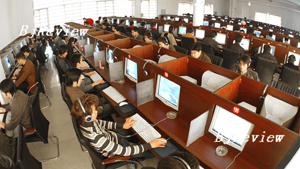
To Zhang Jie, a programmer at a Beijing-based information technology company, the greatest invention of the 21st century is the P2P download system provided by BitTorrent (BT). P2P refers to peer-to-peer, an Internet file sharing application.
Zhang’s computer desk is piled high with clusters of CDs that he has burned over the past five years. One of Zhang’s friends introduced BitTorrent to him and he loved it the moment he successfully downloaded a 600-megabyte movie in two hours.
“It is really exciting to find such a great Internet file sharing system: fast, convenient and rich in all kinds of content,” said Zhang. The first movie he downloaded via BT is a collection of New York underground short films. “You can never get this alternative and rare movie from a regular audio and video store, but BT has brought the resources on the Internet across the world to your doorway; what’s better, they are all for free!”
Over the past five years, Zhang has downloaded numerous movies, music, e-books, software, digital games, cartoons, TV shows, documentaries and other material. “BT can download almost everything that can be transformed into digital form,” he noted. Because of the limited storage capacity of his computer, he has to store what he has downloaded on CDs.
“We borrow quite a lot of stuff from Zhang Jie, as the movies he collected from the Internet can make a small movie database,” Zhang’s friend said. This enthusiasm on the part of Zhang and many others clashes with the intellectual property rights (IPR) of the owners of copyrights to movies, music and other artistic content to receive royalties and recognition for their work. The Chinese Government, however, recently launched a new campaign to protect IPR.
“The government again has begun to crack down on Internet piracy recently, but I don’t think the three-month storm will have any big success,” said Zhang.
The “storm” he mentioned refers to the 100-day anti-piracy campaign that was jointly launched by 10 ministries and national departments, including the Ministry of Public Security, State Administration of Press and Publication, National Copyright Administration (NCA) and Ministry of Culture, at the end of September.
The crackdown is aimed at the illegal downloading of films, music, software and textbooks, which has been described as “rampant.”
”IPR infringements on the Internet not only violate the interests of copyright holders but also stain the country’s reputation globally,” said Long Xinmin, head of the National Copyright Administration.
The intellectual property rights watchdog has vowed to clamp down on major websites that offer unauthorized downloads. While it has no authority to deal with foreign websites offering illegal material, it is targeting local sites that offer links outside the country or unauthorized downloads.
The administration collaborated with major IPR protection associations in the country to collect evidence for 302 Internet IPR infringement cases during a one-month investigation, according to Wang Ziqiang, head of the NCA’s copyright management department.
”The number is double that of last year, which means that Internet copyright infringement is still rampant,” Wang said.
Officials have tracked down the website operators and their details will be passed on to local copyright bureaus for action, said Wang.
Of the 302 cases, 123 are about software IPR infringement, followed by films and music. Most are in developed areas such as Beijing, Shanghai and Zhejiang Province.
“This year’s campaign involves authorized file uploaders but leave out the downloaders. But sooner or later, the big free meal on the Internet will be gone with the rising concern over IPR protection and enhancement of anti-piracy law enforcement,” said Zhang.
Troublesome technology
Bram Cohen, the American creator of the revolutionary piece of software called BitTorrent, is considered a hero in Zhang’s eyes, but to the IPR holders, the inventor is just like a nightmare.
“I think we Internet file downloaders all owe thanks to Bram Cohen. This guy has broadened our eyes and provided everyone with much easier access to share human knowledge and civilization,” said Zhang.
Since the release of this technology in the summer of 2001, BitTorrent has quickly grown into one of the most preeminent file distribution methods. It lets users quickly upload and download enormous amounts of data, files that are hundreds or thousands of times bigger than a single MP3.

| 